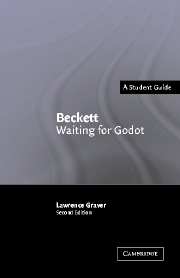2 - Approaching the play
Published online by Cambridge University Press: 05 June 2012
Summary
The drama of unknowingness
At evening on a country road, bare but for a low mound and a spindly tree, two men named Vladimir and Estragon – part tramp, part clown, of indeterminate age – talk fitfully about their thwarted lives and expectantly of an appointment to meet someone named Godot. While they pass the time and wait, two strangers appear, an imperious landowner called Pozzo and at the end of a rope his animal-like servant Lucky. After a bizarre, increasingly mystifying conversation (highlighted by Lucky's opaque and frenzied tirade), the master and his man move on. A boy appears to announce that Mr Godot will not come this evening but ‘surely tomorrow’; and when night falls, Vladimir and Estragon contemplate suicide, decide to leave, but at the first act curtain they do not move. In Act II the basic action is similar: the next day, same time same place, Vladimir and Estragon pass the time and wait; Pozzo and Lucky – now respectively blind and dumb – again arrive and depart; the boy reappears to deliver essentially the same message (Mr Godot will not come this evening but ‘surely tomorrow’); and after again considering suicide, the two men prepare to go but at the final curtain do not move.
To describe Waiting for Godot in this fashion is of course to say almost nothing about its originality and distinction and to ignore nearly everything of consequence about the way it makes itself felt on the stage. Yet such a summary points to something essential for an understanding of why many early theatregoers perceived the work as systematically symbolic.
- Type
- Chapter
- Information
- Beckett: Waiting for Godot , pp. 19 - 69Publisher: Cambridge University PressPrint publication year: 2004



